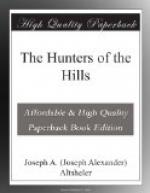Robert told Willet a little later that Father Drouillard had come, and the hunter looked very grave.
“Our task has doubled,” he said. “Now we fight both St. Luc and Father Drouillard, the army and the church.”
CHAPTER XVI
THE GREAT TEST
While Robert and Willet had been glad hitherto that the council of the fifty sachems had delayed its meeting, they were anxious, now that Father Drouillard had come, to hasten it. That the army and the church, that is the French army and the French church, were in close alliance, they soon had full proof. The priest and the chevalier were much together, and Robert caught an occasional flash of exultation in St. Luc’s eyes.
The new influence was visible also among a minority of the Onondagas. The faith of the converts was very strong, and Father Drouillard was to them not only a teacher but an emblem also, and through him, a Frenchman, they looked upon France as the chosen country of the new God whom they worshiped. And Father Drouillard never worked harder than in those fateful days. His thin face grew thinner, and his lean figure leaner, but the fire in his eyes burned brighter. The fifty sachems said nothing. Whether they were for the priest or against him, they never interfered with his energies, because without exception they respected one who they knew sought nothing for himself, who could endure hardship, privation and even torture as well as they, and who also had the gift of powerful and persuasive speech.
The other nations too, except one, listened to him, though less than the Onondagas. The fierce and warlike Mohawks would have none of him, nor would they allow St. Luc to speak to them. Never could a single Mohawk warrior forget that Stadacona was theirs, though generations ago it had become French Quebec. They recalled with delight the numerous raids they had made into Canada, and their many wars with the French. Robert saw that one nation, and it was the one standing on an equality with the Onondagas, was irreconcilable. When the council met the nine sachems of the Mohawks, and their names would be called first, would prove themselves to the last man the bitter and implacable enemies of the French. So, feeling that he was right and loving his own country as much as the priest and the chevalier loved theirs, he deftly worked upon the minds of the Mohawks. He talked to the fiery young chief, Daganoweda, of lost Stadacona that he had seen with his own eyes. He spoke of its great situation on the lofty cliffs above the grandest of rivers, and he described it as the strongest fortress in America. The spirit of the young Mohawk responded readily. Robert’s appeal was not made to prejudice. He felt that truth and right were back of it. As he saw it, the future of the Hodenosaunee lay with the English, the French could never be their real friends, the long breach between Quebec and the vale of Onondaga could not be healed.




